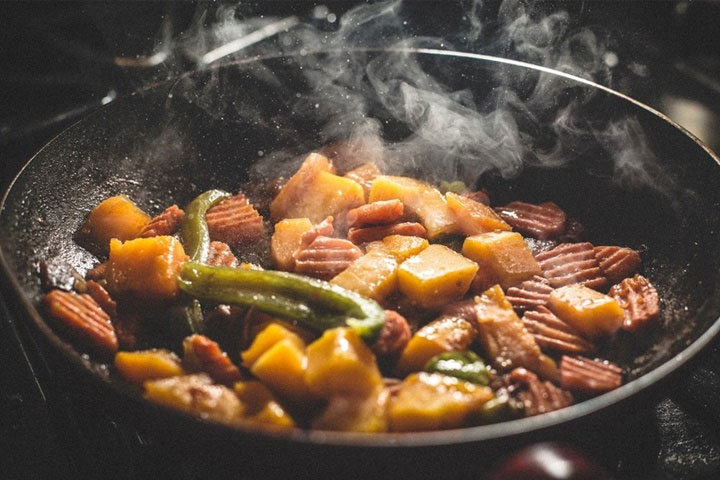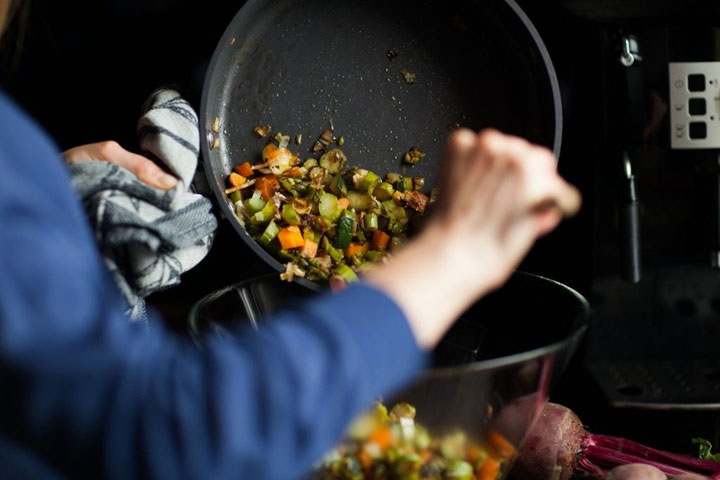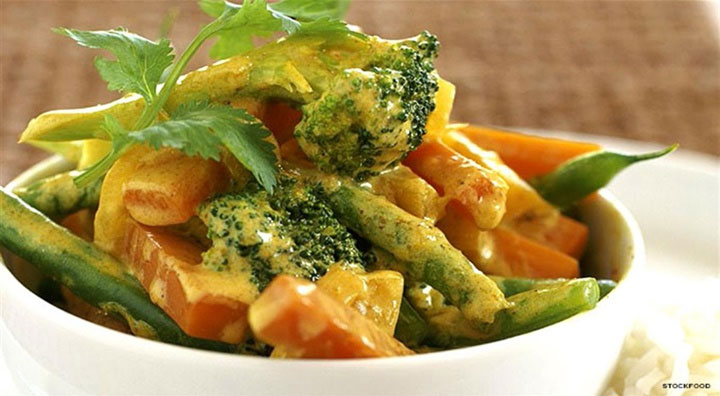How does nutrients change when food is cooked?
Does the nutrient change when food is cooked?
According to Science ABC , in healthy eating times, proper nutrition selection is a top priority for many people, but people around the world also have very different ways to get their calories. In Western countries, many foods are frozen, pre-packed. Other parts of the world eat a lot of fresh food , but some important nutritional ingredients may be missing. Shaping an ideal diet for health is at the core of the $ 700 billion global health food industry. So, you can see there are many different ways to design a meal suitable for you.

There are many different ways to design a suitable meal.
In one day, you can eat a variety of hot, cold, cooked, artificial, fresh and raw foods so there is a very important question that is often asked: cooking changes the value. nutrition of food or not?
The general effect of cooking on food
When you use food with different cooking methods, it will change the nutritional composition of the food , but this is not a bad thing. Some cooking methods will reduce the amount of vitamins or minerals, while others can make other nutrients more absorbable or digestible. When it comes to human evolution, anthropologists often mention the discovery of fire and the ability to cook food. They see this as an important turning point of humanity.

When you use food with different cooking methods, it will change the nutritional composition of the food.
Cooking different types of meat and vegetables will affect nutritional value, there are many variables to be considered, such as food type, maturity, temperature of contact food and cooking methods use (for example, frying, boiling, baking, etc.). Understanding the effects of different types of cooking on some popular vegetables will allow you to customize your diet and diet to achieve nutritional goals!
Nutritional effects of cooking on vegetables
When it comes to cooking vegetables, we want our meals to taste delicious, but we also want to retain the nutritional value. Remember, vegetables are one of the richest sources of vitamins, minerals and antioxidants in our diet. So make sure that unaffected nutrients are an important goal when cooking.
Some argue that boiled vegetables have the most negative effect on nutritional value. Not only are minerals and vitamins absorbed into the water, but the temperature maintained will cause significant damage to antioxidants and reduce their ability to pick up free radicals. Using a microwave oven is another popular and fast option, it is also not harmful to vegetables like onions, spinach, garlic and artichokes.

The best alternative, when it comes to some vegetables, is to eat raw.
Frying of vegetables is not a bad choice, although it can reduce some levels of antioxidants, using high quality olive oil can help reduce vitamin B loss and improve the ability to absorb compounds. plant substances. It is known to reduce vitamin C levels, but it is certainly better than overcooked sautéed vegetables, as it significantly increases oil and fat content and reduces nutritional value with extremely high temperatures.
Some vegetables such as artichokes, spinach, green beans, garlic, onions and radishes . should be cooked for a minimum period of time, at low temperatures, and not with water. The best alternative, when it comes to some vegetables, is to eat raw ! Fresh vegetables have great nutritional value, and while some compounds like lycopene have more in cooked vegetables, you should use fresh pepper in your salad.
The nutritional effect of cooking on meat

When you cook meat, the biggest nutrient you lose is the vitamin B family of nutrients.
While vegetables are considered to be the main source of antioxidants, meat is better known for the contribution of protein, fat and vitamins to the human diet. When you cook meat, the biggest nutrient you lose is the vitamin B family of nutrients. Most cooking methods eliminate 20-50% of them, including B1, B3, B5, B6 and folate, as well as vitamin K, vitamin E and vitamin B12 (in small amounts).
Roasting and roasting meat are considered the best way to process meat, as this exposes less surface area to heat, and thus prevents vitamin loss. The good news is that cooking meat will have less protein loss (according to some recent scientific studies), but the worse the information is, the meat will retain all the cholesterol (though the saturated fat is lost a bit ).
Although proteins can change in the form of cooking, they seem to be able to penetrate our bodies. In fact, cooking meat can make those proteins easier to consume, which explains some of the human digestive evolution that occurred soon after the discovery of fire.

Dried meat and other dehydrated meat forms the most nutritional density by weight.
The best way to consume cooked meat is, unexpectedly, dried . Dried meat and other dehydrated meat forms the most nutrient density by weight, with the least amount of nutrient loss. The worst way to cook meat is in stew, because this way makes most of the surface of the meat surface hot and water will make most of the useful vitamins removed from the food.
Epilogue
Because strict diets may not be appetizing for some people, there are more clever ways to cook food that help you retain more nutrients. These varied cooking methods are a good way to adjust your diet and provide the most comfort possible. However, before you start arguing about the pros and cons of different cooking methods, you must follow a healthy and balanced diet to ensure your health foundation.
- Climate change will cause billions of people to be deficient in nutrients because of poor food
- 3 foods that are easy to poison if not cooked well
- Explain why food changes color when cooked
- Cook food with microwaves that lose nutrients
- 10 golden rules to avoid food poisoning
- Dirty, re-cooked foods can cause more than 200 different diseases
- 4 false rumors about microwave ovens
- Time and how to store eggs and milk
- Nutritional value in insects comparable to beef
- How to use raw and cooked vegetables to be healthy 'superior'
- The original Japanese knew how to cook food
- Cooking can increase nutrition in vegetables
 'Fine laughs' - Scary and painful torture in ancient times
'Fine laughs' - Scary and painful torture in ancient times The sequence of numbers 142857 of the Egyptian pyramids is known as the strangest number in the world - Why?
The sequence of numbers 142857 of the Egyptian pyramids is known as the strangest number in the world - Why? History of the iron
History of the iron What is alum?
What is alum? Common mistakes when using cooking oil increase cholesterol
Common mistakes when using cooking oil increase cholesterol  WHO urges to stay away from these 3 cooking oils if you want to protect your liver
WHO urges to stay away from these 3 cooking oils if you want to protect your liver  A group of students researched turning old cooking oil into soap
A group of students researched turning old cooking oil into soap  Should plastic kitchen utensils be used for cooking?
Should plastic kitchen utensils be used for cooking?  Cooking - an intense breakthrough of evolution
Cooking - an intense breakthrough of evolution  Recipe for burgers
Recipe for burgers 